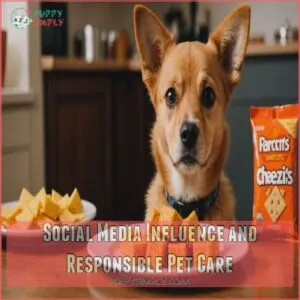This site is supported by our readers. We may earn a commission, at no cost to you, if you purchase through links.
 You’re wondering, "Can dogs eat Cheez-Its?"
You’re wondering, "Can dogs eat Cheez-Its?"
While these cheesy snacks aren’t toxic, they’re not exactly designed with Rover’s health in mind.
Cheez-Its are packed with salt, fats, and calories, which could lead to health issues like obesity and even pancreatitis.
Think of it like this: giving your dog Cheez-Its is like feeding yourself nothing but chips for dinner.
Sure, it might be tempting, but it’s not the healthiest choice.
Instead, opt for dog-friendly treats that help keep their tails wagging for the long haul.
Curious about better snack options for your furry friend?
There’s more to explore beyond the cheese aisle.
Table Of Contents
- Key Takeaways
- Cheez-Its Composition and Risks
- Can Dogs Eat Cheez-Its Safely
- Health Consequences of Cheez-It Consumption
- Dog Owner Guidance and Safe Alternatives
- Social Media Influence and Responsible Pet Care
- Prioritizing Dog Health and Nutrition
- Frequently Asked Questions (FAQs)
- Can dogs eat Cheez-its?
- Can eating cheese cause dizziness?
- Can dogs eat Cheez It Cracker?
- Can dogs eat cheese?
- What happens if my dog eats a Cheez-It?
- Can dogs have crackers cheese?
- Can my dog eat a cheezel?
- Are any cheeses toxic to dogs?
- Are Cheez-Its allergenic for some dog breeds?
- How do Cheez-Its affect dog digestion?
- Can puppies handle occasional Cheez-Its?
- Do Cheez-Its impact dog dental health?
- Are there natural substitutes for Cheez-Its?
- Conclusion
Key Takeaways
- Cheez-Its aren’t toxic for dogs, but they’re not healthy due to high salt, fat, and calorie content, which could lead to obesity or pancreatitis.
- Be cautious of Cheez-It ingredients like enriched flour and cheese, which aren’t ideal for canine consumption and can stir up allergies.
- If your dog eats a Cheez-It, monitor their reaction; a few might not harm, but avoid regular snacking to prevent health issues.
- Opt for healthier alternatives like raw carrots or apples to keep your furry friend’s diet balanced and safe.
Cheez-Its Composition and Risks
When you consider giving your dog a Cheez-It, it’s important to know what’s inside them and the possible risks.
With ingredients like enriched flour, cheese, and various spices, these snacks aren’t just addictive for humans—they can be troublesome for your furry friend too!
Ingredients in Cheez-Its
You’re probably wondering what’s actually in those cheesy squares your dog keeps eyeing.
Cheez-It ingredients aren’t exactly a dog’s best friend.
Let’s break it down:
- Enriched flour: Not exactly a nutritional powerhouse for your furry pal.
- Vegetable oil: Can cause tummy troubles in excess.
- Cheese (skim milk): While dogs can tolerate some dairy, it’s not ideal and can trigger allergies. These aren’t designed for canine consumption, so proceed with caution!
Nutritional Breakdown of Cheez-Its
Cheez-Its pack a punch in a small cracker.
With 150 calories per serving, they’re rich in carbs, sporting 17 grams, and offer 8 grams of fat.
These snacks are undeniably tasty but come with high sodium content.
For your dog’s sake, remember, their diet shouldn’t include these human treats.
A well-balanced canine diet requires proper nutrition for long-term dog health.
Potential Risks of Cheez-Its for Dogs
A handful of Cheez-Its mightn’t seem harmful, but they hide potential risks for dogs. Watch out for these:
- Onion and Garlic Toxicity: Some flavors include these, which are harmful.
- Salt Overload: High salt content can lead to salt poisoning in dogs.
- High Calories: Frequent snacking might cause obesity or pancreatitis due to fat content.
Can Dogs Eat Cheez-Its Safely
If you’ve ever wondered whether dogs can snack on Cheez-Its without worry, you’re not alone—it’s a common question!
While a couple of these cheesy crackers mightn’t immediately harm your furry friend, they’re not exactly a healthy choice due to potential allergy issues, calorie overload, and the risk of obesity.
Effects of Cheez-Its on Dog Health
When considering if dogs can eat Cheez-Its safely, it’s important to weigh the effects of these snacks on dog health.
Frequent munching can lead to obesity, potentially triggering pancreatitis in dogs.
The high salt content poses a risk of salt poisoning.
While a crunchy snack might seem harmless, opting for Cheez-It alternatives or homemade treats can be healthier.
Allergy Concerns and Dairy Content
Dogs and dairy mightn’t always mix, especially when considering human snacks like peanut butter crackers that contain ingredients such as TBHQ in peanut butter crackers. Dogs and dairy mightn’t always mix like peanut butter and jelly.
Milk protein sensitivity or lactose intolerance can make Cheez-Its a risky choice for pups.
If you’re looking for safe alternatives, you can find Dog Cheez Its products here for pets.
Here’s the scoop:
- Wheat allergy worries?
- Dairy allergies in dogs trigger tummy troubles.
- Explore cheese alternatives!
- Lactose intolerance leads to upset stomachs.
- Pet care tips: Skip risky snacks!
Calorie Overload and Obesity Risks
Though dairy issues are a concern, there’s another weight on the scale—calorie overload.
Too many calories can lead to obesity risks, hindering your dog’s weight management.
Like us, dogs thrive on snacks that fit their exercise needs.
Similar risks are associated with high-sodium snacks like saltine crackers, which can also have negative effects on canine health.
| Emotion | Before Cheez-Its | After Cheez-Its |
|---|---|---|
| Joyful Life | Plenty of play | Tired and slow |
| Happy Tummy | Healthy snacks | Upset stomach |
| Healthy Heart | Strong and fit | Struggling heart |
Consider homemade dog treats to keep tails wagging!
Health Consequences of Cheez-It Consumption
Those cheesy squares might seem tempting, but feeding your dog Cheez-Its regularly can lead to some serious health problems, like weight gain, pancreatitis, or even salt poisoning.
Let’s explore the specific risks and why healthier alternatives are a much better choice for your furry friend.
Lack of Nutritional Value for Dogs
After exploring whether Cheez-Its are safe for your furry friend, it’s clear they’re not a good choice nutritionally.
Cheez-Its lack essential nutrients dogs need.
Consider these points:
- Protein Deficit: Dogs thrive on high-quality proteins.
- Unnecessary Fats: Excess fats risk obesity.
- No Added Value: Cheez-Its offer zero nutritional benefits compared to AAFCO-approved dog food or homemade dog treats.
Pancreatitis Risk and Signs
While Cheez-Its don’t offer much nutritional value, they can trigger more serious issues like pancreatitis in dogs.
Fatty foods are notorious pancreatitis triggers, so those tasty crackers pose a real risk.
Consider opting for Dog Safe Cheez Its alternatives to satisfy your dog’s cravings without the risks.
Watch for pancreatitis symptoms such as vomiting, diarrhea, and abdominal pain.
It’s wise to keep your pooch on a dog pancreatitis diet to avoid these unexpected vet visits.
Prevention tips go a long way!
Salt Poisoning Symptoms and Risks
Imagine your pup devours Cheez-Its like a vacuum cleaner on a snack mission.
Excessive salt can lead to salt poisoning in dogs, causing symptoms like vomiting, diarrhea, and lethargy.
In severe cases, seizures or even death can occur.
Keeping an eye on your dog’s salt intake protects their health.
If you suspect salt toxicity, seek immediate salt poisoning treatment from a vet.
Dog Owner Guidance and Safe Alternatives
If your dog accidentally munches on a Cheez-It or two, don’t panic, but keep an eye on them for any unusual symptoms.
Meanwhile, you can offer safer snack choices like raw carrots, sliced apples, or even homemade dog treats to keep their tails wagging and their health on track.
What to Do if a Dog Eats Cheez-Its
A few Cheez-Its probably won’t make your dog do the cha-cha of distress, but keep an eye on them.
If Fido gobbles down half the box, here’s your action plan:
- Monitor for any odd reactions or upset stomachs.
- Contact your vet if they’re lethargic or show serious symptoms.
- Plan to store Cheez-Its away from snouts.
Healthy Snacking Alternatives for Dogs
If your dog sneaks a Cheez-It, don’t fret.
Considering the potential health risks of popular human snacks, such as those associated with sodium-rich tortilla chips, instead, focus on healthy snacking alternatives.
Treats like raw carrots, apples, and bananas keep tails wagging.
Just steer clear of grapes and avocados.
A quick peek at the table below gives you safe, wholesome ideas:
| Snack Type | Benefits |
|---|---|
| Raw Carrots | Low-calorie |
| Apples | Fiber-rich |
| Bananas | High potassium |
| Cooked Chicken | Lean protein |
Preparing Healthy Treats at Home
So, you’ve explored healthier store-bought options; now let’s make your own Homemade Dog Treats!
It’s easier than you think.
If you’re considering rolled oats as a nutritious and allergy-friendly ingredient, learning more about homemade dog treats rolled oats can help you get started.
You can find many dog-friendly recipes online, but remember to avoid biscuits containing xylitol, an artificial sweetener that’s toxic to dogs, and always consult your vet for the best options for your furry friend. Here are some simple Recipe Ideas using safe Dog Treat Ingredients:
- Peanut butter and banana "puppies."
- Sweet potato chews.
- Chicken and carrot mini-meatballs.
- Frozen yogurt pops (plain yogurt only!).
Making Homemade Dog Food is a fun way to control ingredients and show your pup some love!
Social Media Influence and Responsible Pet Care
Social media can sometimes suggest that sharing snacks like Cheez-Its with your dog is harmless fun, but these trends aren’t always pet-friendly.
It’s important to rely on informed choices and safe treats to guarantee your pet gets the balanced diet they need for a happy, healthy life.
Misleading Social Media Influencers
Scrolling through social media, you might see influencers feeding their dogs Cheez-Its, making it seem fun.
But remember, social media pet trends can be misleading.
Influencer accountability is key; check whether their advice aligns with vet-approved treats and food safety education.
Your pup’s health depends on knowledge, not the latest dog food marketing hype.
Keep treats safe and sensible!
Importance of Balanced Diet and Safe Treats
While social media might make it tempting to share that Cheez-It snack with your pup, remember that a balanced diet is key.
Dog treat alternatives, like homemade dog treats and approved commercial dog treats, offer healthier choices.
Consulting pet nutritionists helps guarantee your furry friend enjoys safe, tasty bites without unnecessary risks.
For picky eaters, consider top dog food brands for picky eaters. Prioritize their well-being with quality dog food brands.
Pet Food Companies and Cheez-It Alternatives
Pet food companies are crafting smart Cheez-It alternatives that cater to dog owners who choose not to feed their pets animal crackers high in sugar. Pet food companies are crafting smart Cheez-It alternatives that cater to healthy dog snacks and modern dog treat trends.
They focus on natural pet food ingredients, aligning with AAFCO guidelines to guarantee safety.
Whilst influencers might hype certain trends, always double-check with a vet to make sure your furry friend’s treats are more than just a tasty treat but nutritionally sound, too.
Prioritizing Dog Health and Nutrition
To keep your furry friend healthy, always focus on providing them with nutritious options like whole grain oats, as seen in safe multigrain cereal options. To keep your furry friend healthy, always focus on providing them with high-quality dog food and treats that meet their nutritional needs.
Regularly consulting with veterinarians about your pet’s diet makes sure you’re making informed choices, so your dog can wag along happily and healthily.
Monitoring Dogs for Signs of Illness
It’s easy to be distracted by the latest pet trends online.
But keeping an eagle eye on your dog’s health is key, especially when it comes to identifying underlying causes of diarrhea, such as stress and anxiety, that can lead to more severe issues if left unchecked learn more about canine diarrhea.
Watch for pancreatitis symptoms and other signs of illness.
Changes in behavior often signal something’s off.
Look out for:
- Vomiting & diarrhea
- Lethargy & weakness
- Loss of appetite
- Frequent thirst
- Unusual whining or whimpering
Choosing High-Quality Dog Food and Treats
Keeping your pup healthy means smart food choices!
Look for dog food brands meeting AAFCO standards; check ingredient lists – you want to know what you’re feeding.
Consider a homemade dog treat recipe now and then, but always prioritize a balanced diet.
Remember, a little ingredient analysis goes a long way in ensuring your furry friend thrives.
Don’t forget, a raw diet might be an option, but talk to your vet first!
Consulting With Veterinarians for Pet Health Concerns
Veterinarian consultations are your go-to for understanding pet health resources.
Prioritize regular vet visits to address common dog ailments and gain nutritional guidance.
They can offer pet insurance benefits, making the unexpected less frightening.
Paying close attention to your vet’s advice guarantees your furry friend stays happy and healthy, avoiding any preventable mishaps.
So, don’t skip the vet—your dog deserves it!
Frequently Asked Questions (FAQs)
Can dogs eat Cheez-its?
Imagine a dog eyeing Cheez-Its like treasure, but sadly, they aren’t great for pups.
While an occasional cracker mightn’t harm, frequent snacking risks weight gain and allergies.
Stick to dog-friendly treats for safety.
Can eating cheese cause dizziness?
Eating cheese can cause dizziness if you’re sensitive to tyramine, which is present in aged cheeses.
Tyramine might trigger headaches or migraines, leading to dizziness.
If you notice this, consider reducing your cheese intake and consulting a doctor.
Can dogs eat Cheez It Cracker?
Surprisingly, 27 Cheez-It crackers pack 150 calories, which can be a calorie overload for your dog.
Dogs shouldn’t eat Cheez-Its regularly due to high salt and fat content, which may lead to health issues.
Can dogs eat cheese?
Some dogs can tolerate small amounts of cheese, but it’s not ideal.
Too much can upset their stomachs or cause allergies.
Always check with your vet before giving your pup any human food.
A balanced dog diet is key!
What happens if my dog eats a Cheez-It?
Imagine this: your dog snaffles a Cheez-It off the floor.
Usually, it’s not a disaster, but keep an eye out.
Too many snacks may upset their tummy or contribute to weight gain.
Stay vigilant!
Can dogs have crackers cheese?
You might think cheese crackers are a tasty snack for your dog, but they’re not the healthiest choice.
These snacks can lead to weight gain and health issues due to high salt and fat content.
Stick to dog-friendly treats instead!
Can my dog eat a cheezel?
While a Cheezel might seem tempting, it’s best to keep them away from your dog.
Their high salt and fat content can cause health issues like pancreatitis.
Stick to dog-friendly treats for your furry friend’s safety.
Are any cheeses toxic to dogs?
Most cheeses are safe for dogs in small amounts, but avoid blue cheeses like Roquefort, which contain roquefortine C, a substance toxic to dogs.
Stick to less rich varieties like mozzarella and cheddar to keep your pup safe.
Are Cheez-Its allergenic for some dog breeds?
Back in the day, dairy was a dog’s kryptonite—still is!
Cheez-Its could stir allergies, especially in sensitive breeds.
The dairy content might just kick that canine allergy into overdrive.
Better play it safe and steer clear.
How do Cheez-Its affect dog digestion?
Cheez-Its can upset your dog’s digestion.
Their high fat and salt content might cause stomach troubles like bloating and diarrhea.
Plus, flavors containing onion or garlic powders can be harmful.
It’s best to keep them out of reach.
Can puppies handle occasional Cheez-Its?
Puppies’ tiny tummies are extra sensitive.
Did you know that salt in Cheez-Its can cause serious problems for them?
It’s best to skip the cheesy snacks altogether and stick to dog-friendly treats.
Your pup will thank you!
Do Cheez-Its impact dog dental health?
You might be wondering if Cheez-Its impact your dog’s dental health.
While they don’t directly harm teeth, their high carbohydrate content can contribute to dental problems like tartar buildup and cavities if good oral hygiene isn’t maintained.
Are there natural substitutes for Cheez-Its?
Crunchy carrots, crisp apples, and juicy blueberries make tasty, natural Cheez-It alternatives.
These healthy snacks delight dogs without the guilt.
Add some spice to snack time with a sprinkle of creativity and a dash of fun!
Conclusion
Tempted to let your dog share your snack, aren’t you?
While asking, "Can dogs eat Cheez-Its?", remember these cheesy squares aren’t just harmless fun.
Packed with salt and fat, Cheez-Its could lead Rover down a path of health woes like obesity or even pancreatitis.
It’s like a Cheese-It craving gone wild for them!
Instead, opt for healthier dog treats that keep their tails wagging.
Offer snacks that are truly made for your furry friend, ensuring they stay healthy and happy.














